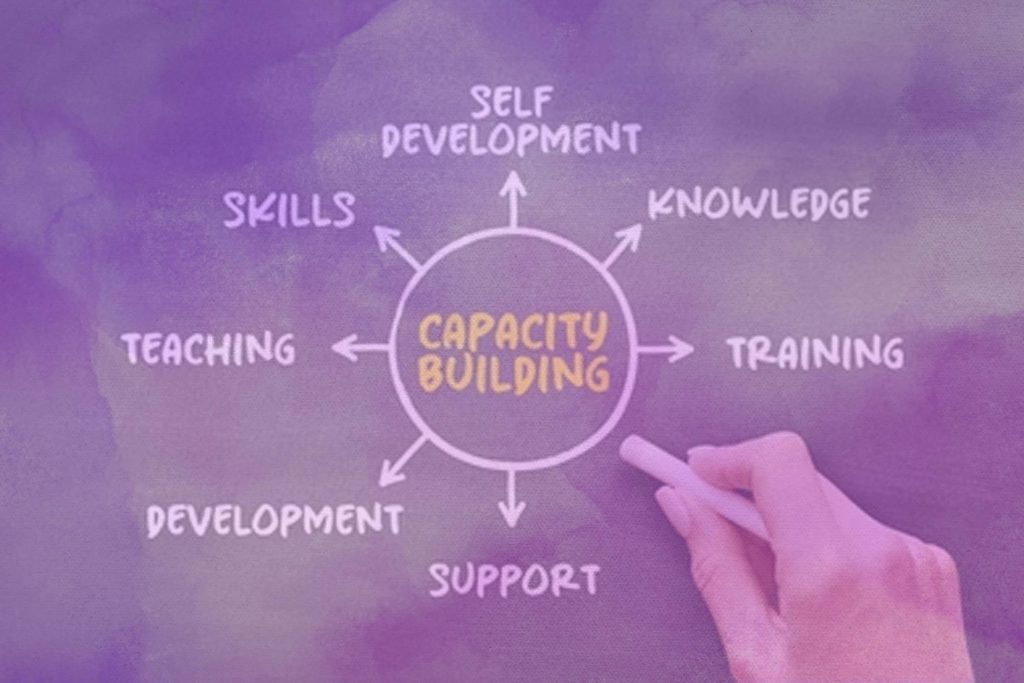Introduction
Capacity development is a rooted & multidimensional process aimed at enhancing an individual’s abilities to achieve their personal, academic, and professional goals. It encompasses a range of skills and knowledge areas that enable people to adapt, innovate, and thrive in various environments. This holistic approach ensures that individuals are well-equipped not only with academic expertise but also with personal resilience, professional competencies, global awareness, and a commitment to health and wellness.
Table of Contents
Toggle
Building capacity development involves a strategic and holistic approach that encompasses various aspects of personal, academic, professional, and social growth. Here are key steps to effectively build capacity development:
How to build capacity development:
- Assess Needs and Set Goals
- Conduct a Needs Assessment:
– Identify the specific skills, knowledge, and resources required by individuals or organizations.
– Use surveys, interviews, and feedback mechanisms to gather data on current capacities and gaps.
- Define Clear Objectives:
– Set SMART (Specific, Measurable, Achievable, Relevant, Time-bound) goals based on the needs assessment.
– Ensure objectives are aligned with both immediate and long-term aspirations.
- Develop a Comprehensive Plan
- Create a Tailored Development Plan:
– Design a plan that addresses the identified needs and goals.
– Include various components like academic skills, personal development, professional growth, global awareness, and health and wellness.
- Allocate Resources:
– Ensure the availability of necessary resources, including financial, human, and material resources.
– Leverage technology and partnerships to optimize resource utilization.
- Implement Targeted Training Programs
- Academic Skills Development:
– Organize workshops on critical thinking, research methods, and digital literacy.
– Provide access to online courses and educational resources.
- Personal Development:
– Offer training on emotional intelligence, resilience, and stress management.
– Facilitate goal-setting and time-management workshops.
- Professional Skills Training:
– Conduct career exploration sessions, resume writing, and interview preparation workshops.
– Offer leadership and project management training.
- Global Awareness and Cultural Competence:
– Promote intercultural exchange programs and global issue awareness seminars.
– Encourage participation in sustainability and environmental initiatives.
- Health and Wellness Programs:
– Provide education on nutrition, physical health, and mental wellness.
– Organize regular health check-ups and wellness activities.
- Foster a Supportive Environment
- Mentorship and Coaching:
– Establish mentorship programs pairing experienced professionals with novices.
– Provide ongoing coaching to support personal and professional growth.
- Collaborative Learning:
– Encourage teamwork and peer-to-peer learning.
– Create communities of practice for sharing knowledge and best practices.
- Feedback and Evaluation:
– Implement regular feedback mechanisms to assess progress and impact.
– Use evaluations to refine and improve development programs.
- Utilize Technology and Innovation
- Digital Learning Platforms:
– Leverage online learning platforms for accessible and flexible training.
– Use mobile apps for microlearning and continuous education.
- Gamification and Interactive Tools:
– Incorporate gamification to make learning engaging and interactive.
– Use simulations and virtual reality for practical skill development.
- Encourage Continuous Learning and Improvement
- Lifelong Learning Culture:
– Promote a culture of continuous improvement and learning.
– Encourage individuals to pursue further education and professional certifications.
- Stay Updated with Trends:
– Keep abreast of industry trends, technological advancements, and best practices.
– Adapt development programs to incorporate new knowledge and skills.
- Monitor and Sustain Efforts
- Track Progress:
– Use key performance indicators (KPIs) to measure progress against set goals.
– Regularly review and adjust strategies based on performance data.
- Ensure Sustainability:
– Develop strategies for the long-term sustainability of capacity development initiatives.
– Foster partnerships and secure funding to support ongoing efforts.
Setting Up Capacity
Here, Sholarsyatra has mentioned a detailed & informative overview of;
Academic Skills:
The foundation of capacity development often begins with strengthening academic skills. Critical thinking and problem-solving are at the core of academic prowess, enabling students to analyze information and develop reasoned conclusions. Research skills are equally vital, teaching students how to conduct thorough investigations, use credible sources, and synthesize information effectively. Effective study techniques, including time management and exam preparation, ensure that students can retain and apply knowledge efficiently. Digital literacy is increasingly important in today’s educational landscape, equipping students with the skills to navigate online resources, utilize educational software, and understand digital security.
Personal Development:
Personal development focuses on nurturing an individual’s emotional and psychological well-being. Emotional intelligence, which includes self-awareness, empathy, and emotional regulation, is crucial for personal and interpersonal success. Building resilience and adaptability helps individuals cope with challenges and changes, fostering a growth mindset. Goal setting and planning are essential for personal achievement, teaching individuals to set realistic objectives and develop actionable plans. Mindfulness and stress management techniques are important for maintaining mental health, promoting overall well-being, and enhancing focus and productivity.
Professional Development:
Professional development prepares individuals for the workforce by equipping them with necessary career skills. Career exploration helps individuals understand various industries and job roles, aiding in informed career choices. Resume writing and job application skills are critical for securing employment, while interview skills prepare individuals to present themselves effectively to potential employers. Networking is another key component, helping individuals build professional relationships and explore opportunities. Leadership skills, including project management and team dynamics, are essential for those aspiring to managerial or leadership roles.
Global Awareness:
In an interconnected world, global awareness is indispensable. Cultural competence fosters understanding and respect for diverse cultures, enhancing interpersonal interactions and collaboration in multicultural settings. Awareness of global issues, such as climate change and social justice, encourages individuals to think beyond their immediate environment and contribute to global solutions. Sustainability and environmental awareness promote responsible behaviors that protect our planet for future generations.
Health and Wellness:
Health and wellness are fundamental to capacity development. Understanding nutrition and physical health ensures individuals maintain a balanced diet and regular exercise routine, essential for physical well-being. Sexual health education provides knowledge about healthy relationships, consent, and reproductive health. Mental health awareness, including strategies for managing stress, anxiety, and other mental health issues, is crucial for maintaining overall well-being. Encouraging regular health check-ups and preventive care also plays a significant role in long-term health maintenance.
Summary
Capacity development is a comprehensive approach that prepares individuals for success in various aspects of life. By focusing on academic skills, personal development, professional competencies, global awareness, and health and wellness, this approach ensures that individuals are not only knowledgeable but also resilient, adaptable, and responsible global citizens. Empowering individuals through capacity development fosters a more capable, innovative, and compassionate society.


